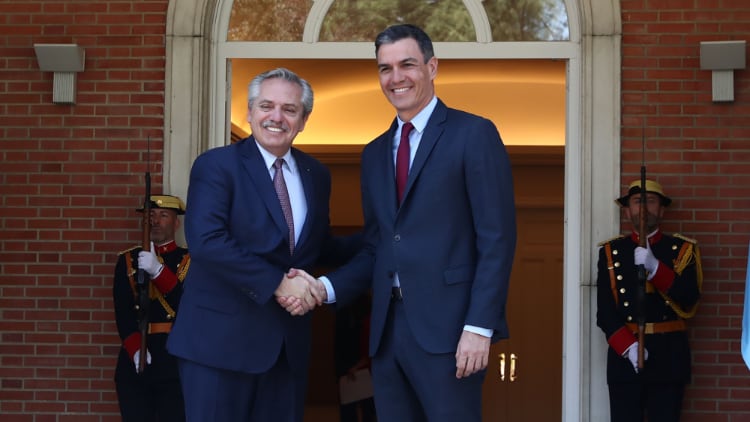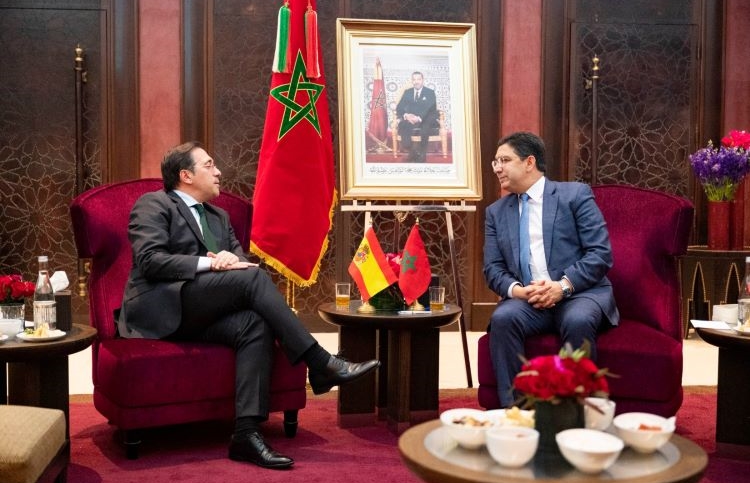Luis Ayllón
Argentina yesterday offered itself to the European Union as a “stable and secure” supplier of energy and food, at a time when the European continent is trying to find alternatives to Russian gas, following the invasion of Ukraine launched by the president of the Russian Federation, Vladimir Putin.
The European tour that Argentine President Alberto Fernández began yesterday in Madrid and which, after Spain, will take him to France and Germany, is clearly marked by the conflict in Ukraine.
In the Spanish capital, the Argentine President was received by His Majesty the King at the Zarzuela Palace, where he was accompanied by the Foreign Minister, Santiago Cafiero, and the Ambassador to Spain, Ricardo Alfonsín, as well as the Secretary of State for Latin America, Juan Fernández Trigo, on the Spanish side.
Fernández also met for an hour and twenty minutes with the President of the Government, Pedro Sánchez, who, on his Twitter account, emphasised that they both agreed in their total condemnation of the Russian attack on Ukraine and in their respect for international legality and multilateral order.
With the conflict in Ukraine in the background and its humanitarian and economic consequences, Fernández raised with Sánchez the possibility of Argentina becoming a “stable and secure” supplier of food and energy, according to the Argentinean president on Twitter. “Argentina, he wrote, “has a central concern for the problems of food security and energy supply. We can be a stable energy supplier and also provide not only raw materials, but also applied biotechnology. We took the first step towards this.
In a press release, Moncloa stressed that the two governments are willing to “increase cooperation in the digital and energy fields, especially in the gas and lithium sectors”.
For his part, Foreign Minister Cafiero, in a meeting at the Argentine Embassy with journalists covering the presidential tour, said that Fernández “emphasised that Vaca Muerta can be a supplier of natural gas for Spain and the region”. Specifically, he indicated that the latest large-scale infrastructure work being undertaken in Vaca Muerta with the “Néstor Kirchner” gas pipeline, “is going to allow Argentina to be self-sufficient in energy and the possibility of being a natural exporter of liquefied natural gas”.
Cafiero indicated that Sánchez highlighted the productive development and Spanish businessmen in Argentina, with the aim of “making progress on different agreements” linked to energy exports, and said that Spain has 30 percent of the regasification plants in Europe, which could also complement a bilateral agreement to make progress on the supply of this type of gas for the whole continent.
Fernández is expected to reiterate his offer at meetings in the coming days in Berlin with the German Chancellor, Olaf Scholz, and in Paris with the French President, Emmanuel Macron.
Beyond the war in Ukraine and the European concern about the situation, which Fernández has been able to perceive during her tour, the Argentine president wants to take advantage of her stay in Europe to attract more investment to the South American country.
According to a note from the Casa Rosada, in his meeting with Pedro Sánchez, Alberto Fernández was able to ratify “the mutual interest in strengthening and diversifying investments and bilateral trade” between Spain and Argentina. Thus, the note adds, they analysed progress in the implementation of the “Action Plan for the Deepening of the Strategic Partnership (PAE)” 2021-2023 as a way to work on the issues identified as priorities for both countries.
The note also states that during the meeting Fernández and Sánchez expressed their “agreement on the social and human rights agenda and on the need to promote public policies that generate greater equality”.
They also highlighted their interest in “working on the Ibero-American agenda to continue connecting Latin America and the Caribbean with Spain and Portugal”, and in this regard, the Argentine president said that “knowledge-based service companies are beginning to enter the European market thanks to Spain”.
Furthermore, Fernández and Sánchez undertook to work on integration initiatives with the European Union, within the framework of Argentina’s pro tempore presidency of the Community of Latin American and Caribbean States (CELAC), and also by chairing the United Nations Human Rights Council this year.
Alberto Fernández thanked Sánchez for Spain’s support and backing for Argentina’s position on the Malvinas Question, as well as its support for the negotiations with the International Monetary Fund.
For his part, Foreign Minister Cafiero met with the Spanish Minister of Foreign Affairs, José Manuel Albares, whom he also thanked for his support in the Malvinas dispute, particularly in the framework of the Ibero-American Summits, and conveyed to him the importance for the Argentine government of discouraging any initiative aimed at facilitating the continuation of illegal fishing in the archipelago.
Part of the conversation focused on trade and investment, a point on which, according to information provided by official sources in Argentina, Cafiero stressed that “in Argentina’s productive structure, SMEs are a driving force for development and a major generator of jobs”, and for this reason, they wish to participate in the Plan for the Internationalisation of the Spanish economy, in which the Spanish government itself has made Latin America, and especially Argentina, a priority region for the destination of projects and investments.
Spain is a strategic partner of Argentina, where it is the second largest foreign investor and where there are some 300 companies that generate more than 100,000 direct jobs.







